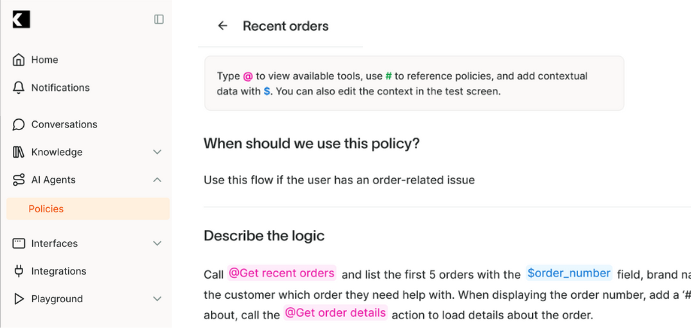Ingredients
ShipMonk, Gladly, and Kodif.
What are AI Policies?

At Kodif, we’re excited to announce the launch of Policies—a powerful, dynamic solution designed to revolutionize the way CX managers handle customer support. Unlike traditional flows, which are rigid and complex, Policies empower non-technical users to create and manage customer interactions with ease. Written in natural language, Policies make it simple to define and refine customer experiences without needing to rely on complicated flowcharts or scripting. This approach is not only user-friendly but also self-serve, enabling CX teams to quickly translate existing Standard Operating Procedures (SOPs) into automation, saving valuable time and resources.
The flexibility of Kodif Policies ensures that businesses can offer personalized, context-driven support while continuously improving customer experiences. With Policies, you can experiment with different strategies to optimize outcomes such as CSAT, revenue, and retention—all without the need to rebuild complex workflows. Whether it’s automating routine interactions or testing new approaches for high-stakes scenarios, Policies provide a scalable, adaptable solution that aligns with your business goals. While flows still have their place in sensitive, high-risk situations, Policies offer an agile alternative that helps businesses innovate faster and deliver exceptional, tailored experiences at scale.
“WISMO” Ticket Type Explained
“WISMO” stands for “Where Is My Order?” and is a common type of inquiry in the realm of customer support, particularly in e-commerce and retail sectors. These tickets arise when customers inquire about the status or location of their orders, seeking clarity on shipping progress, estimated delivery times, or tracking details. Effective handling of WISMO tickets is crucial for maintaining customer satisfaction, as it directly impacts the customer’s perception of the service experience and the overall brand reputation.
Businesses must ensure that their customer support systems are equipped to handle WISMO tickets efficiently. This involves integrating order tracking systems, providing clear communication, and offering self-service options that allow customers to check order status independently. By doing so, companies can reduce the volume of WISMO tickets reaching their support teams, freeing up resources to handle more complex inquiries and enhancing the overall customer experience.
Which Platforms Does This AI Policy Work On?
This AI policy is designed to work seamlessly with ShipMonk, Gladly, and Kodif. Moreover, Kodif integrates with all other major platforms, ensuring a smooth and efficient customer support experience across various systems.
When Should I Use This Policy?
This policy should be employed whenever customers inquire about the status of their orders. It is particularly useful in managing WISMO requests, ensuring that customers receive timely and accurate information regarding their shipments.
Describe the policy logic using the following steps:
- Ask for the user’s email address:
- Use @get_shipmonk_account_details to verify if the user with that email exists in ShipMonk.
- If the email address is not found, ask for a valid email address.
-
If the email address is still not found, route it to an agent for further investigation.
-
Display Recent Orders:
- Use @get_shipmonk_orders to retrieve the user’s recent orders.
- Display the list of recent orders and ask the user which specific order they would like to inquire about.
-
If the order is not found, route to an agent for further investigation.
-
Check Order Status:
- For the selected order, retrieve the shipping status using @shipmonk_order_details(order_id: str).
- If “Approved”, inform that the order was approved and is waiting to be processed.
- If “Processing”, inform that the order was processed and is waiting to be shipped.
- If “Pending Shipment”, inform that the order is pending shipment and provide a shipment date.
- If “Shipped”, inform that the order was shipped and is waiting to be in transit and provide the tracking number.
- If “In transit”, use the tool @shipmonk_order_details to check if the order is within the estimated delivery date. If yes, inform the order is in transit and provide the expected delivery date. If no, inform the customer that the route is delayed and that the request will be transferred to an agent for investigation.
- If “Delivered”, inform that the order was delivered and confirm with the customer if the order was delivered. If the order was not delivered, route to an agent or create a ticket to escalate for further investigation.
- If “Canceled”, inform that the order was already canceled.
Policy Logic
The policy logic outlined above should be utilized to manage WISMO inquiries effectively. By leveraging AI policies, businesses can automate routine tasks, streamline customer interactions, and ensure that customers receive accurate and timely information about their orders.
Example Policy
To see this policy in action, consider the following logic tailored for use with ShipMonk and Gladly. Replace Shopify-specific commands with the appropriate commands for these platforms, such as using @get_shipmonk_account_details instead of @get_shopify_account_details.
By using these AI policies, businesses can efficiently manage customer inquiries, reduce the workload on support teams, and enhance the overall customer experience.


